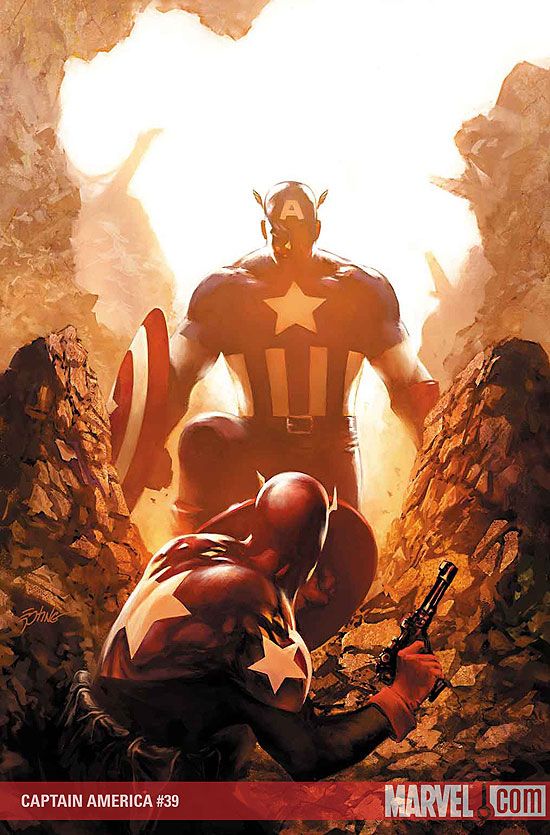I recently heard a fan of this comic talking about how frustrated he was that the story "hasn't ended yet." I'm not sure which story he was talking about, but I think he meant that, here we are, at issue #39, and the plot threads which began the series back in issue #1 still remain unresolved. And that's true. If Brubaker is to be believed, then we still have a long way to go before any of it is concluded. We're still in Act Two territory here, and Act Three isn't even on the horizon. But, I have to admit, I'm not frustrated by Brubaker's pacing at all. In fact, I think "Captain America," with its long-form structure, extended plot lines, and complex machinations, is one of the most exhilarating superhero comics on the shelves today.
I do understand the frustration. I actually experienced it a bit earlier on this title, back when I expected Brubaker to do something traditional here. When this comic still hadn't resolved the opening Red Skull plotline by issue #18 or 19, I started getting impatient. Annoyed, even. But that's because I didn't trust Brubaker, or I hadn't settled in to the passenger seat of this fancy new Captain America van of his. But once the post-Death of Cap subplots started to emerge, and once I realized that Brubaker was actually telling an incredibly ambitious story in this series -- one that could very possibly last for five years or more -- I settled in, and I've enjoyed the ride ever since.
The thing is, "Captain America" is packed with plot twists and character moments. It's not Bendis' "Daredevil," which was all about interior conflict and paralysis. No, this is a comic book series that has moved tremendously from where it began, but the looming threat hasn't disappeared. The Red Skull, Dr. Faustus, and Arnim Zola continue their evil scheme. And Bucky Barnes slowly grows into the role he was born to play.
One might argue that Brubaker is hitting too close to home with some of the recent political rhetoric spouted in these last few issues. "Captain America" #39 has very specific references to an economy in decline, high gas prices, and a country on the verge of great turmoil. But Brubaker isn't dropping in these political realities to sensationalize today's headlines. He has an in-story reason for the erosion of the American economy, and it's all part of his long-term story. This may be a story where the villains are a bunch of Nazi super-scientists, but it's also a story where those super-scientists are operating behind the scenes to manipulate the direction of this country. It's a new kind of threat for a new kind of Captain America, and I think Brubaker's overlap with real national fears only helps his themes resonate more powerfully.
This issue features plenty of plot: Bucky and the Falcon spar and put things in perspective for each other and for the reader; a new Captain America makes his national media debut, and Bucky Barnes has to figure out who this imposter is; Sharon Carter plans her escape; and then that final confrontation promised by the cover. This is good stuff, well illustrated by Rob De La Torre and over-colored by Frank D'Armata (that's really my only complaint about the issue -- D'Armata's overbearing coloring -- but even I have to admit that his work keeps the look incredibly consistent from artist to artist).
If you're like that anonymous fan I mentioned in the first paragraph, just think about it this way: Isn't this comic really good right now?
Then why are you so eager to see it come to an end?
Accept "Captain America" for what it is -- an elaborately developed superhero saga that, once it's completed, will take up three or four Omnibus volumes. Or one giant, awesome volume that will be so impressively huge you'll need robot arms just to lift it.

